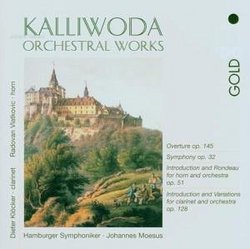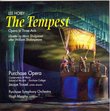| All Artists: Johann Wenzel Kalliwoda, Johannes Moesus, Hamburg Symphony Orchestra Title: Kalliwoda: Orchestral Works Members Wishing: 0 Total Copies: 0 Label: MD&G Records Original Release Date: 1/1/2006 Re-Release Date: 6/27/2006 Genre: Classical Styles: Forms & Genres, Concertos, Symphonies Number of Discs: 1 SwapaCD Credits: 1 UPC: 760623138725 |
Search - Johann Wenzel Kalliwoda, Johannes Moesus, Hamburg Symphony Orchestra :: Kalliwoda: Orchestral Works
 | Johann Wenzel Kalliwoda, Johannes Moesus, Hamburg Symphony Orchestra Kalliwoda: Orchestral Works Genre: Classical
|
Larger Image |
CD DetailsSimilar CDs
|
CD ReviewsSchumann Admired Kalliwoda--The Third Symphony Tells You Why M. C. Passarella | Lawrenceville, GA | 01/16/2007 (5 out of 5 stars) "Johann Wenzel Kalliwoda (or Jan Vaclav Kalivoda) was a prolific Czech composer who, for some reason, abandoned the symphony early in his career, writing only seven and finishing his last in the 1840s, about 20 years before his death. Of those seven, the Third Symphony in the dramatic key of D minor was the most highly praised by his contemporaries. Among those admiring contemporaries was one Robert Schumann, who apparently learned a thing of two from Kalliwoda, his own Third Symphony, the Rhenish, employing the swooping horn calls of Kalliwoda's symphony, as well as some of the galumphing folksiness of the Czech composer's third-movement minuet. In some ways, this is the most interesting and original movement, a rough peasant dance whose "Menuetto" marking seems like a wry joke on Kalliwoda's part. Interestingly, the trio section is a fleet and airy presto that recalls Mendelssohn in his fairy-music vein.
As the good notes to this recording intimate, among Kalliwoda's chief influences is Weber; those horn calls and the generally dark atmosphere of the imposing first movement are aptly likened to the Wolf's Glen music from "Der Freischutz." But ultimately, Kalliwoda is his own man and projects a stronger profile than other composers of his generation who straddled the classical and romantic music worlds. Like all symphonists of his time, he shows his debt to Beethoven in various ways, especially the tight structuring of the first movement, which grows out of a typically Beethovenian motto figure (this one, interestingly enough, created by one of Kalliwoda's children, whom the composer heard noodling around at the piano, repeating the strange little figure again and again). But the working out of the material is not especially Beethovenian, and the orchestral color that Kalliwoda brings to his symphony is much closer to late Schubert, with its heavy reliance on the trombones. Kalliwoda couldn't have known the last two symphonies of Schubert, which were debuted long after Schubert's death and the debut of Kalliwoda's symphony, but he might have heard Schubert's music for Rosamunde, which the symphony recalls in spots. Kalliwoda also seems to point a bit forward to Berwald, who was one of the first composers to write independently for the orchestral trombones; the powerful start of the last movement of Berwald's Sinfonie Singuliere (1845) recalls the same pages in Kalliwoda's Third Symphony (1831). In any event, Kalliwoda is a master orchestrator, his orchestral palette more colorful and slightly more "modern" than that of other Beethoven imitators who have received recording premieres lately, such as Ferdinand Ries, Friedrich Fesca, Johann Wilms, and Georges Onslow. The concerted works on the disc--The Introduction and Variations for clarinet and orchestra and the Introduction and Rondeau for Horn and Orchestra--underscore Kalliwoda's indebtedness to Weber, who wrote similar short concerted pieces for these instruments. They're attractive and well played by the two soloists. The Overture, one of twenty some that Kalliwoda penned over the years, is a pleasant affair that again recalls Weber, especially in its direct quotation of the patriotic Furstenberg Anthem. Weber did just the same with "God Save the King" in his Jubel Overture, creating a more memorable work, I think. But Kalliwoda's Overture is useful in charting the course of his orchestral career and in substantiating the promise shown in the Third Symphony. It is clearly the work of an accomplished master. The performances from Johannes Moesus and the Hamburg Symphony are sympathetic, capturing well the different moods--from dramatic to playful--represented by this music. And the recording, while seemingly a little distant, packs lots of punch at the climaxes, where the drums and brass really make a showing. So for those who like the music of Weber, Schubert, and even Hummel, Kalliwoda should prove an appealing discovery. " |

 Track Listings (9) - Disc #1
Track Listings (9) - Disc #1

